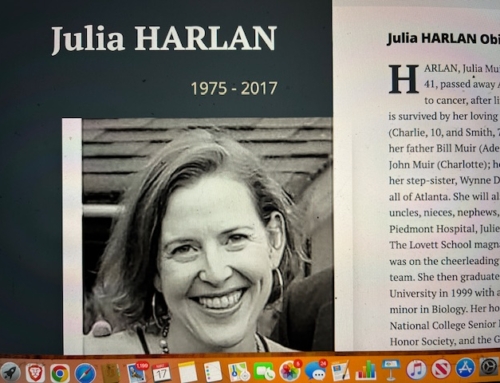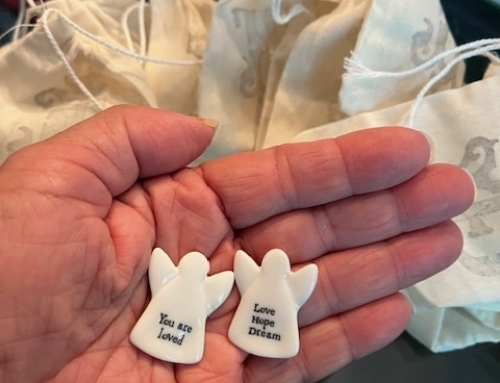
Good morning…
I just woke from a dream, short and intriguing.
My husband had forgotten to tell me that there was a large plastic container in our backyard with a huge pile of leaves beside it. He had spent hours raking the leaves in our yard, and he expected me to somehow transfer the leaves into this big black box. I needed to do it before the winds picked up and blew the leaves all over the yard again, negating all the hard work he had done. But he forgot to tell me his expectations, so when I finally found out about it in the middle of the night, I woke panicked that the leaves had blown all over the yard again.
End of dream. What’s that all about?
Separate roles. Unspoken expectation. Poor communication. Assuming without discussing. The anxiety of not knowing. Hard work negated.
These challenging dynamics remind me of the Sunday school lesson I taught at church this week, a teaching based on the November 14th devotional message in New Morning Mercies by Paul David Tripp.
“I have been married for many years,” writes Tripp. “From a distance, you would conclude that we basically have a problem-free marriage. But our relationship is still messy. We typically spend Mondays together. We love these days and enjoy the ability to spend them with one another. But somewhere in the middle of one recent Monday, a misunderstanding erupted between us. We both got defensive. The tension was obvious. Too much silence followed until we asked one another’s forgiveness. ‘Too minor to worry about,’ you say, but these are the moments we live in.”
“I tell people all the time that we don’t just live in the big, important moments,” continues Tripp. “We live in little moments, so the character of our relationships is not set on three or four big moments, but in ten thousand little moments of life. What do the little moments of your relationship look like? How are you dealing with the messiness that lives there?”
Exploring the Scripture verses identified in the devotional, we turned to the Bible to get deeper insight. I divided the class in two, assigning one group the task of unpacking thoughts spurred from 2 Corinthians 5:14-15 in three different translations.
The very spring of our actions is the love of Christ. We look at it like this: if one died for all men then, in a sense, they all died, and his purpose in dying for them is that their lives should now be no longer lived for themselves but for him who died and rose again for them (PHILLIPS).
Christ’s love has moved me to such extremes. His love has the first and last word in everything we do. Our firm decision is to work from this focused center: One man died for everyone. That puts everyone in the same boat. He included everyone in his death so that everyone could also be included in his life, a resurrection life, a far better life than people ever lived on their own (MSG).
For it is Christ’s love that fuels our passion and holds us tightly, because we are convinced that he has given his life for all of us. This means all died with him, so that those who live should no longer live self-absorbed lives but lives that are poured out for him—the one who died for us and now lives again (TPT).
Footnote: 5:14 Paul uses the Greek word synechō (syn = “together with”; echō is where we get our English word echo), which is translated as “seize,” “compel,” “urge,” “control,” “lay hold of,” “overwhelm,” “to be held together,” “to grip tightly,” “completely dominate.” Paul is stating that the motivating passion of his life is Christ’s love filling his heart, leaving him no choice but to surrender everything to God.
After discussing key words, we settled into the question “In the nitty and the gritty of the thousand little moments, what does it look like to live a resurrection life with Christ?”
The second group was asked to unpack Ephesians 4:17-32 in The Passion Translation, a passage of Scripture entitled “Our New Life in Christ.” These are the wise, detailed instruction from verses 29-32.
- And never let ugly or hateful words come from your mouth, but instead let your words become beautiful gifts (Or “constructive”) that encourage others; do this by speaking words of grace to help them.
- The Holy Spirit of God has sealed you in Jesus Christ until you experience your full salvation. So never grieve the Spirit of God or take for granted his holy influence in your life (“do not limit his scope”).
- Lay aside bitter words, temper tantrums, revenge, profanity, and insults. But instead be kind (Or “sweet”) and affectionate toward one another.
- Has God graciously forgiven you? Then graciously forgive one another in the depths of Christ’s love.
The grace of mutual forgiveness miraculously happens as we hold tightly to God’s holy influence in our lives, echoing the depths of Christ’s limitless love. Unable to box up our pile of unmet expectations, we are left with no choice but to surrender everything to God. Day after day, into Christ’s loving care, we release all of our messy moments of leaves-blowing-everywhere-after-hours-of-hard-work.
Amid the inescapable messiness of human relationship, our defensive “big I” must die with Christ, again and again and still some more. God invites everyone into this painful process of dying-to-self so that everyone is included in Christ’s resurrection life, a far better life than any of us will ever live on our own.
…Sue…





